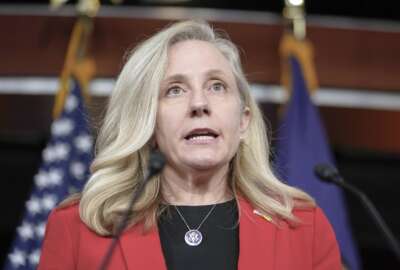House Reps gear up for another push to eliminate WEP and GPO
In today's Federal Newscast, the House may finally hold a floor vote on repealing the Windfall Elimination Provision and Government Pension Offset.
- When lawmakers get back to Capitol Hill next month, they’ll be in for a bigger push on the Social Security Fairness Act. Reps. Abigail Spanberger (D-Va.) and Garret Graves (R-La.) plan to force a House floor vote on their legislation. If enacted, the bill would revoke the Windfall Elimination Provision and Government Pension Offset. They're two Social Security provisions that either reduce or eliminate benefits for certain federal employees. Bipartisan efforts to end WEP and GPO have gone on for years. But there has never been a floor vote on the issue. Currently, the bill has 325 co-sponsors in the House and 62 in the Senate.(Social Security Fairness Act - Reps. Abigail Spanberger (D-Va.) and Garret Graves (R-La.) )
- The Biden administrative is showing agencies how to keep tabs on their use of artificial intelligence. A memo from the White House tells agencies to send an inventory of AI use cases to the Office of Management and Budget by mid-December. AI use cases for national security and federal research are exempt from the inventory. Legislation passed by Congress and President Joe Biden's AI executive order require agencies to keep track of such an AI inventory. Agencies identified more than 1,200 AI use cases at the end of last year. (Guidance for 2024 agency AI reporting - White House)
- Starting today, the General Services Administration is formally offering services to the Harris and Trump campaigns for their presidential transition planning. Both campaigns can now get access to furnished office space in the nation’s capital, channels of communication with other agencies, and even IT support. The Partnership for Public Service is urging both parties to take GSA up on the offer, since transition planning is already months behind schedule. During a press conference Monday, Max Stier, the Partnership’s president and CEO, said “there’s a lot of catching up to do.”(Presidential transition planning update - Partnership for Public Service)
- The cloud security program known as FedRAMP has its first permanent director in more than three years. Pete Waterman, a former engineer with the U.S. Digital Service and a former advisor for the Technology Modernization Fund, is the new director of the Federal Risk Authorization Management Program (FedRAMP) cloud security program. Waterman returned to government after leaving the TMF in February, according to an email obtained by Federal News Network. He replaced Ashley Mahan, who left in January 2021 as the permanent director. Brian Conrad, who had been acting director for more than three years, left in March. Waterman previously worked at the U.S. Digital Service as a staff engineer and with the Technology Modernization Fund at a senior technical advisor focused on cloud migrations and zero trust. (FedRAMP has a permanent director for first time in 3 years - Federal News Network)
- The Cybersecurity and Infrastructure Security Agency wants to continue building out its cybersecurity collaboration with industry. CISA’s Joint Cyber Defense Collaborative (JCDC) is working on a new playbook for responding to artificial intelligence security incidents. That comes after the JCDC hosted an inaugural AI tabletop exercise with 50 experts from government and industry. CISA launched the JCDC three years ago. After some initial growing pains, the group now includes 340 partners from across different industry sectors. CISA said the goal is to continue driving collective cyber defense.(Shaping the legacy of partnership between government and private sector globally: JCDC - Cybersecurity and Infrastructure Security Agency)
- The Defense Advanced Research Projects Agency launches five regional commercial accelerators to facilitate the transition of DARPA-funded technologies into the commercial market. The regional commercial accelerators will support early-stage DARPA-funded companies by providing them with resources, training and expertise to scale DARPA technologies faster. DARPA Commercial Accelerators builds upon the agency’s Embedded Entrepreneur Initiative pilot program. Since 2022, the program has helped DARPA performers secure over $1 billion in private investment capital. The program has facilitated the launch of more than 21 new products, services and capabilities.
- Two House lawmakers are pushing the Equal Employment Opportunity Commission to explain why it almost had to furlough almost all of its employees. Reps. Virginia Foxx (R-N.C.), the chairwoman of the Committee on Education and the Workforce, and Kevin Kiley (R-Cali.) are accusing agency leadership of “severe mismanagement.” The Republicans wrote to EEOC Chairwoman Charlotte Burroughs seeking documents and answers to questions about the decision to first issue the possible furlough notice and then to rescind it. An EEOC spokesman disputed the lawmakers' claims, saying the agency has limited hiring and made significant, across-the-board operating cuts to all divisions to close the budget gap.(House lawmakers push for EEOC to defend furlough threat - Federal News Network)
- The IRS said it’s cracking down on fraud, but small businesses said the agency is putting them through delays. The IRS said it avoided paying billions of dollars in fraudulent claims. But it did so by holding up the processing of pandemic-era employee retention credits. Now a group of small businesses is suing the agency over its delays. The businesses said hundreds of thousands of legitimate claims for this tax credit remain on hold at the IRS. Businesses can claim the credits if they kept employees on payroll at the height of the COVID-19 pandemic. The IRS ended its hold on processing these claims earlier this month. It said the pause helped it flag $5 billion in potentially fraudulent claims.
- The Department of Homeland Security wants to expand its growing cadre of artificial intelligence talent. DHS is recruiting for up to 20 new positions in its AI Corps. Applications close on September 6. DHS is looking for experts in human-center design, software engineering, AI security, machine learning and data science. The department announced the AI Corps earlier this year. New hires typically start out at DHS headquarters and then are detailed to department components to work on specific AI projects.(Job announcement: AI technology expert - USAJobs)
- The Air Force’s AI launch point is the service’s one-stop shop for all things AI. The platform allows Airmen and Guardians to access training and policy resources, submit AI use cases and view the service’s AI inventory. The AI Exchange App Store already has several AI applications available for use. Clara, for instance, is an AI tool designed to track how much the service spends on AI and measure the impact of AI technologies on day-to-day operations. Launched earlier this summer, the service’s NIPRGPT allows airmen and guardians to experiment with various AI models to determine which one is best suited for a specific use case. Most resources require a common access card.
Copyright © 2025 Federal News Network. All rights reserved. This website is not intended for users located within the European Economic Area.
Eric White
Eric White is news anchor and Federal Drive producer at Federal News Network.
Follow @FEDERALNEWSCAST







